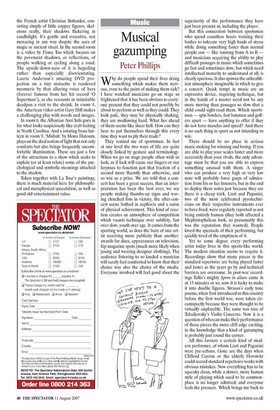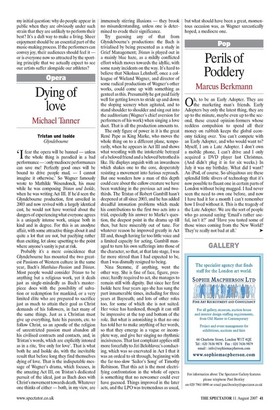Musical gazumping Peter Phillips Why do people spend their lives
doing something which makes them nervous, even to the point of making them sick? I have watched musicians go on stage so frightened that it has been obvious to everyone present that they could not possibly be about to perform as well as they could. They look pale, they may be physically shaking, they are swallowing hard. What lies ahead of them seems like sheer hell. How can they bear to put themselves through this every time they want to ply their trade?
They remind me of sportsmen. In fact at one level the two ways of life are quite closely linked by gesture and terminology. When we go on stage people often wish us luck, as if luck will cause our fingers or our larynxes to function just that fraction of a second more fluently than otherwise, and so win us a prize. We are told that a concert has been a great success, that an interpretation has been the best ever; we see people making thumbs-up signs and waving clenched fists in victory, the after-concert scene bathed in euphoria and a sense of physical achievement. This kind of reaction creates an atmosphere of competition which vaunts technique over subtlety, fast over slow, youth over age. It comes from the sporting world, as does the buzz of one artist receiving more publicity than another: awards for discs, appearances on television, hip magazine spots (much more likely when young and wearing designer clothing). The audience listening to so lauded a musician will surely feel comforted to know that their choice was also the choice of the media. Everyone involved will feel good about the superiority of the performance they have just been present at, including the player.
But this connection between sportsmen who spend countless hours training their bodies to tolerate very high loads of stress while doing something faster than normal people can — like running from A to B — and musicians acquiring the ability to play difficult passages in music which sometimes go fast and sometimes slow, but which need intellectual maturity to understand at all, is clearly spurious. It also spawns the unhealthiest atmosphere imaginable in which to give a concert. Quick tempi in music are an expressive device, requiring technique, but in the hands of a master need not be any more moving than passages so slow that a child could sight-read them. Which sportsmen — spin bowlers, fast batsmen and golfers apart — have anything to offer if they do not have muscles and speed? And there is no such thing in sport as not intending to win.
There should be no place in serious music-making for winning and losing. If you are able to play your scales faster and more accurately than your rivals, the only advantage must be that you are able to express something unusual with them. A singer who can produce a very high or very low note will probably force gasps of admiration from his or her listeners, but in the end to deploy these notes just because they are there is a cheap trick. Liszt and Paganini, two of the most celebrated pyrotechnicians on their respective instruments ever to have lived, were regularly reported as not being entirely human (they both affected a Mephistophelean look, so presumably this was the reputation they wanted). People loved the spectacle of their performing, but quickly tired of the emptiness of it.
Yet to some degree every performing artist today lives in this sports-like world. The modern situation seems to require it. Recordings show that many pieces in the standard repertoire are being played faster and faster as the years go by and technical barriers are overcome. In post-war recordings Tallis's mighty Spem in alium came in at 15 minutes or so; now it is lucky to make it into double figures. Strauss's early tone poems, when first introduced to this country before the first world war, were taken circumspectly because they were thought to be virtually unplayable. The same was true of Tchaikovsky's Violin Concerto. Now it is a question of who can make their performance of these pieces the more cliff-edge exciting, in the knowledge that a kind of gazumping is probably just round the corner.
All this favours a certain kind of modern performer, of whom Liszt and Paganini were pre-echoes. Gone are the days when Clifford Curzon or the elderly Horowitz could record standard repertoire works with obvious mistakes. Now everything has to be squeaky clean, while a slower, more human style of playing which used to be commonplace is no longer admired; and everyone feels the pressure. Which brings me back to my initial question: why do people appear in public when they are obviously under such strain that they are unlikely to perform their best? It's a daft way to make a living. Sheer enjoyment should be an essential part of the music-making process. If the performers can convey joy, their audiences should feel it — or is everyone now so attracted by the sporting principle that we actually expect to see our artists suffer alongside our athletes?










































 Previous page
Previous page